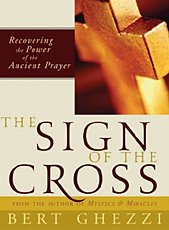
I found a very good answer to this question from a Zenit article. Zenit provides a series of weekly articles that originate directly from the Vatican. You can subscribe to their weekly email updates. Log on to http://www.zenit.org/.
I have edited the answer below, for the sake of brevity. If you want to read the full article please click here.
The simple gesture that Catholics make thousands of times in their lives has a deeper meaning most of them don't realize.
Q: When did the sign of the cross originate?
Bert Ghezzi*: The sign of the cross is a very ancient practice and prayer. We don't have any indication of it in Scripture, but St. Basil in the fourth century said that we learned the sign from the time of the apostles and that it was administered in baptisms. Some scholars interpret St. Paul's saying that he bears the marks of Christ on his body, in Galatians 6:17, as his referring to the sign of the cross. In the book, I note that the sign originates close to Jesus' time and goes back to the ancient Church. Christians received it in baptism; the celebrant signed them and claimed them for Christ.
Q: How did it become such an important liturgical and devotional practice?
Ghezzi: I speculate that when adult Christians were baptized, they made the sign of the cross that claimed them for Christ on their forehead proudly. Tertullian said that Christians at all times should mark their foreheads with the sign of the cross. I can imagine that Christians would make a little sign of the cross with their thumb and forefinger on their foreheads, to remind themselves that they were living a life for Christ.
Q: Beyond the words themselves, what does the sign mean? Why is it a mark of discipleship?
Ghezzi: The sign means a lot of things. In the book, I describe six meanings, with and without words. The sign of the cross is: a confession of faith; a renewal of baptism; a mark of discipleship; an acceptance of suffering; a defense against the devil; and a victory over self-indulgence. When you make the sign, you are professing a mini version of the creed — you are professing your belief in the Father, and in the Son and in the Holy Spirit.
When you say the words and pray in someone's name you are declaring their presence and coming into their presence — that's how a name is used in Scripture.
The sign of the cross is a mark of discipleship. Jesus says in Luke 9:23, "If any man will come after me, let him deny himself, and take up his cross daily, and follow me." The word that the Fathers of the Church used for the sign of the cross is a Greek word that is the same as what a slave owner put on a slave, a shepherd put on a sheep and a general put on a soldier — it's a declaration that I belong to Christ.
Q: Do non-Catholics use the sign of the cross?
Ghezzi: Yes, the sign of the cross is used by Episcopalians, Lutherans, Methodists and Presbyterians, particularly in baptisms. In his small catechism, Martin Luther recommends making the sign of the cross at bedtime and first thing in the morning. It's a shame that many non-Catholics see it as something they shouldn't be doing; it comes from an ancient Church that we all share. One of my hopes in writing this book is that non-Catholics will read it and share in the sign of the cross.
Q: Why do Catholics use the sign of the cross with holy water upon entering and exiting a church?
Ghezzi: In order to participate in the great sacrifice of the Mass, you need to be baptized. Using holy water to sign yourself is saying "I am a baptized Christian and I am authorized to participate in this sacrifice." When you make the sign of the cross when you leave, you say that the Mass never ends — your whole life is participating in Christ's sacrifice.
When I see professional athletes make the sign of the cross during games, I'm not critical of them. It says that everything I do, I do in the name of Christ — even games can be played in the presence of God. When people make the sign of the cross casually, I pray that they will recognize how serious it is — that they are declaring that they belong to Christ, they want to obey him and accept suffering. It's not a good-luck charm.
* Bert Ghezzi, author of "Sign of the Cross: Recovering the Power of the Ancient Prayer" (Loyola Press).